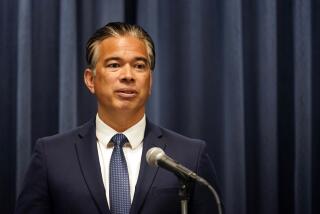California Sues Outside Auditor in Lincoln Case : Accounting: The firm that merged to become Ernst & Young is accused by the state attorney general of helping defraud investors out of $250 million.
- Share via
State Atty. Gen. John K. Van de Kamp filed suit Wednesday against Arthur Young & Co., charging that the accounting firm helped defraud thousands of investors who bought more than $250 million worth of American Continental Corp. bonds.
The bonds are now worthless, and American Continental has filed for bankruptcy protection. Arthur Young was the company’s independent auditor and has since merged with Ernst & Whinney to become Ernst & Young.
Also named in the suit were Charles H. Keating Jr., chairman of American Continental; other officers and directors of the company, which is the parent of Irvine-based Lincoln Savings & Loan, and Jack Atchison, an Arthur Young accountant who handled the American Continental account and then joined the Phoenix-based company at a much higher salary.
But Van de Kamp made clear that the main target of the suit is the accounting firm, partly because the other defendants have been the subject of more suits.
Accounting firms functioning as independent auditors have been much criticized for failing to more closely scrutinize thrifts that have since run into financial trouble, and some accounting firms have been banned by the federal Resolution Trust Corp. from working on thrift reorganization cases. But accounting firms have complained that they are being made scapegoats for the S&L; crisis.
“If investors had known the truth, no one would have invested a dime in those bonds,” Van de Kamp said at a news conference in Los Angeles. “But with Arthur Young standing behind them, their bonds sold easily.”
The suit contends that the accountants failed to follow standard procedures, thereby making American Continental look healthier than it was. In 1987, financial statements prepared by Arthur Young show American with operating earnings of $27 million when the company actually lost $30 million to $50 million, Van de Kamp said.
An Ernst & Young lawyer vehemently denied the charges.
“We categorically reject the assertion that our work did not comply will all professional standards,” said Eugene Erbstoesser, associate general counsel for Ernst & Young. “We stand behind our audit work. While it may be a long and arduous process, we believe we will be vindicated.”
The suit, filed in Orange County Superior Court, seeks full restitution of the more than $250 million lost by more than 20,000 people, many of them elderly investors who bought the bonds through Lincoln Savings. The suit also seeks civil penalties, which Van de Kamp estimated could range between $50 million and $100 million, and attorney fees and suit costs. Van de Kamp is also asking for an injunction blocking the allegedly unfair business practices of the defendants.
“Charles Keating and his associates at American Continental Corp. were running a huge financial con game and sucking the assets out of Lincoln Savings to sustain their operations,” Van de Kamp said. American Continental “engaged in a transparent series of sham real estate transactions and other unfair business practices designed to hide its true financial picture,” and the company’s auditor should have known about them, he said.
Lawyers for American Continental, which was not named in the suit, accused Van de Kamp of “grandstanding.”
Noting that the state Department of Corporations filed a suit in March, American Continental lawyer James J. Feder said, “It looks to us like a waste of time, effort and taxpayers’ money in a duplication of efforts.
“There’s a different name on the top (of the suit) so some other politician can say they’re protecting the public,” Feder said.
Atchison’s lawyer could not be reached. Bondholder lawyers had a mixed reaction.
“I welcome the attorney general, but where has he been for the last year?” asked Joseph W. Cotchett Jr., a Burlingame lawyer who is co-lead counsel for bondholders.
William S. Lerach, a San Diego lawyer who is the other co-lead, called the suit “duplicative and unnecessary.”
“If more tax dollars are to be spent litigating against Mr. Keating, they should have been spent by the Department of Justice” in a criminal action, not a civil case, Lerach said. He said $26 million in settlements with two law firms has already been negotiated in class-action suits filed in Orange County.
Van de Kamp said he considered the suit complementary rather than a duplication.
“I am here today to announce we’re trying to get the bondholders’ money back,” he said.
More to Read
Inside the business of entertainment
The Wide Shot brings you news, analysis and insights on everything from streaming wars to production — and what it all means for the future.
You may occasionally receive promotional content from the Los Angeles Times.










